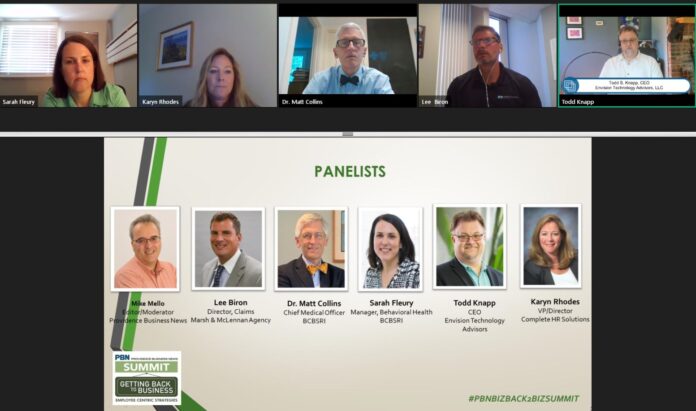
Reopening workplaces as states allow it and as COVID-19 fades will be a delicate process heavily dependent on expert guidance, excellent communications and transparency in companies, and goodwill by everyone involved.
The situation could even bring unsought benefits to businesses, such as greater familiarity and future use of telework and a surge of desirable applicants applying for jobs as unemployment insurance coverage expires.
Those were some of the observations by panelists Thursday during Providence Business News’ virtual Getting Back to Business Summit.
The entire summit may be viewed online.
Panelists included Lee Biron, director of claims for Marsh & McLennan Agency; Dr. Matt Collins, executive vice president and chief medical officer of Blue Cross Blue Shield of Rhode Island; Sarah Fleury, manager of behavioral health for Blue Cross Blue Shield of Rhode Island; Todd Knapp, CEO of Envision Technology Advisors; and Karyn H. Rhodes, vice president and director of Complete HR Solutions.
Nearly all of the panelists alluded to a document published by the state of Rhode Island that outlines rules and guidelines for protecting people in the workplace and restoring normalcy as COVID-19 dissipates.
Rhode Island is now in phase two of reopening, allowing restaurants, salons, offices and other businesses to open, but with strict conditions.
The process of reopening businesses and offices doesn’t, in fact, even begin at the front door or employee entrance, panelists said. It begins with companies creating a state-required COVID-19 control plan, for which a template exists on ReopeningRI.com.
As businesses’ doors open, employees are protected – and reassured – by screenings of symptoms that businesses are required to conduct on everyone entering a company’s property, panelist said. The screenings can be as simple as a questionnaire done verbally, by smartphone app, or by phone.
Collins said testing employees for COVID-19 or antibodies is not recommended because it can turn up false results. Taking peoples’ temperatures got a lukewarm reaction from panelists, too.
Knapp made an appeal against temperature-taking, saying that it’s an action that, combined with other protections, pushes people into a climate of fear and insecurity. He counseled against a workplace where “every minute of the day we are reminded of how different things are and how limited we are.”
To a question about helping workers with mental and emotional health struggles during COVID-19, Fleury said companies – including top executives – should check often with employees, even by observation over video if necessary, and watch for signs of depression, agitation, helplessness and lapses in self-care.
She noted that sales of alcoholic beverages have gone up during quarantine, and drinking can aggravate depression.
Apart from shifting work schedules, moving work areas, providing masks and cleaners, monitoring deliveries and vendors, and buoying workers, managers have to be conversant on issues such as fraud, liability and insurance.
As for people who may be declining to return to work when asked, simply because they are making more money on unemployment insurance, that is fraud, Rhodes said.
Employers should invited employees back to the job via certified letter; keep a detailed record of conversations with employees with such an argument; and remind them they could be prosecuted and fined.
Biron warned businesses of the potential for disagreements with some employees over returning to work, with claims of emotional distress and wrongful termination flying back and forth. He said employers’ liability insurance can offer some protection and added, “I advise businesses to review their employer liability programs and insurance.”
Above all, companies must be transparent and consistent in expectations about employees’ return to work. “When you’ve got inconsistencies you open yourself to exposure,” Biron said. “Attorneys are waiting to jump. We are already seeing class-action suits.”












